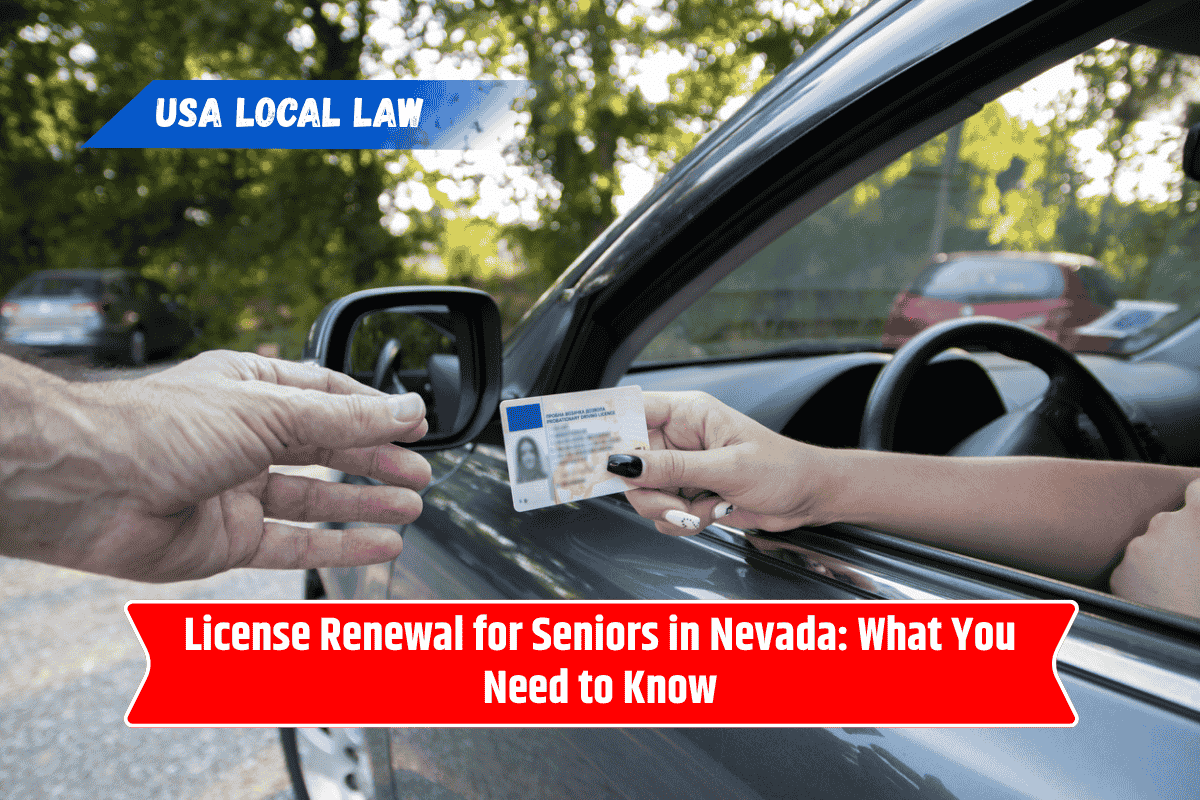As drivers age, the process of renewing a driver’s license in Nevada becomes an important step in maintaining road safety. For senior drivers, Nevada has specific rules and requirements to ensure that all drivers are capable of safely operating a vehicle.
If you’re a senior driver in Nevada, it’s essential to understand these requirements so you can stay on the road legally and safely. Here’s a breakdown of the key points regarding license renewal for seniors in Nevada.
How Often Do Seniors Need to Renew Their License in Nevada?
In Nevada, drivers aged 65 and older are required to renew their driver’s license every 4 years, compared to the standard 8 years for drivers under 65. While this is a more frequent renewal schedule, it helps ensure that senior drivers are still fit to drive safely on Nevada roads.
Do Seniors Need to Take a Driving Test for License Renewal?
Typically, seniors are not required to take a driving test to renew their license in Nevada, but they may be asked to take a vision test. Vision exams are crucial because good eyesight is vital for safe driving.
If a senior driver’s vision has deteriorated, it might impact their ability to pass the vision test, potentially requiring corrective measures like glasses or contact lenses.
However, in some cases, if there are concerns about a senior’s driving abilities, they may be asked to take a road skills test. This could happen if:
The DMV has received complaints about the senior driver’s driving.
The driver is involved in an accident.
A medical professional or family member has expressed concerns about the driver’s fitness to drive.
How to Renew Your License as a Senior in Nevada
Seniors in Nevada can renew their driver’s license in several ways. The methods available depend on the individual’s circumstances:
1. In-Person Renewal
For seniors who are required to renew in person, you will need to visit a Nevada DMV office. Here’s what you’ll need to do:
Bring the required documents: This includes your current driver’s license, proof of identity (if required), and proof of residency.
Complete a vision test: The DMV will have a vision screening, and if your eyesight is poor, you may be required to wear corrective lenses.
Pay the renewal fee: The cost of renewing your license may vary, but it’s typically around $42 for an in-person renewal.
Complete the form: Fill out a renewal application, which is available at the DMV office or online.
2. Online Renewal
Seniors who are not required to take a vision test or any other additional screening may be eligible for online renewal. To renew online:
Check eligibility: If you’re over 70 or have been asked to take a vision test or driving test, you may not be able to renew online.
Visit the Nevada DMV website: Complete the online form, pay the renewal fee, and your new license will be mailed to you.
Eligibility for online renewal: You can renew online as long as there are no significant changes to your driving record and you’re not being asked to retake any tests.
3. Mail-In Renewal
In some cases, seniors who have not made significant changes to their information or driving record may receive a mail-in renewal notice. If you’re eligible, you can follow the instructions in the mail, including sending in your payment and completing the renewal form.
Medical Evaluation for Senior Drivers
Nevada law requires drivers to self-report certain medical conditions that may affect their ability to drive. Seniors are responsible for reporting conditions such as:
Seizures
Loss of consciousness
Vision or hearing impairments
Cognitive conditions, such as dementia
If a senior driver is concerned about their medical fitness to drive, it’s advisable to have a medical evaluation by a doctor before renewing their license. If necessary, the DMV may require further assessments, which could include a road test or other evaluations to determine whether the driver is safe to be on the road.
Renewal Restrictions for Seniors
In Nevada, there are no specific age-based restrictions on driving. However, as drivers age, it’s important to recognize when their ability to drive may be impaired.
If a senior driver cannot safely drive, they may voluntarily surrender their license, or the DMV may request that they turn in their license based on medical evaluations or reports.
If a senior driver’s ability to operate a vehicle becomes impaired due to medical conditions, the DMV may require that they:
Surrender their license voluntarily.
Submit a medical report for evaluation.
Take additional tests, such as a road skills test.
What Happens If You Don’t Renew on Time?
If a senior driver doesn’t renew their license by the expiration date, they could face fines or penalties. However, in Nevada, you can renew your license within 1 year after it has expired without needing to take a driving test, as long as you meet the eligibility criteria.
After this period, the DMV may require a re-application process, which could include additional testing.
In Nevada, seniors have specific guidelines for renewing their driver’s licenses. While the renewal process may be more frequent, with vision tests and possibly additional evaluations, it is designed to ensure that all drivers — including seniors — are fit to drive safely.
Seniors can renew in person, online (if eligible), or by mail, depending on their circumstances. If you’re a senior driver in Nevada, make sure to stay on top of your renewal schedule and take the necessary steps to ensure that you meet the state’s requirements for safe driving.
